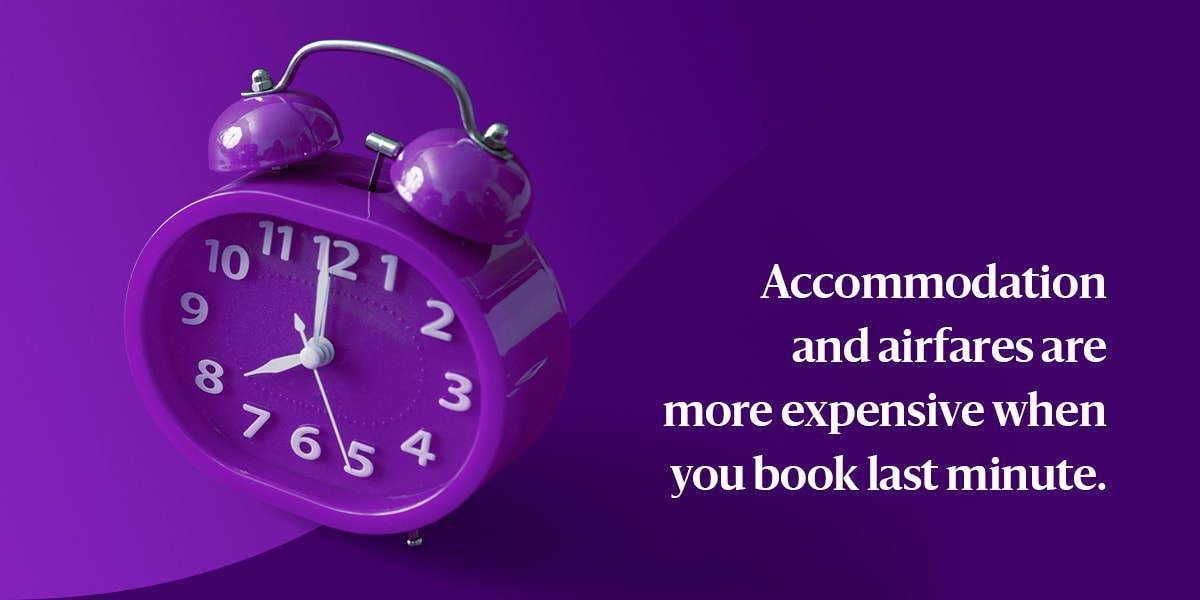Master Your Business Travel Budget: Proven Ways to Control Overspending
The Navan Team
•10 Aug 2023•
For many companies, corporate travel plays a vital role in driving growth and success. But without careful planning and management, business travel spending can quickly get out of control.
Having guidelines to control business travel costs can help improve the employee travel experience, ease the administrative burden on travel managers and finance teams, and guard your company’s bottom line.
This guide will help travel managers and finance leaders set and stick to an appropriate corporate travel budget. Follow these tips to make business trips smooth, rewarding, and budget-friendly.
7 Ways to Rein in Business Travel Spending
If your business travel budget tends to exceed the projected travel program spend, there are ways to fix the issue. Using these tips will encourage employees to stay within budget while ensuring they have a smooth trip.
1. Set Clear Corporate Travel Policies
Clear corporate travel policies help employees make cost-effective choices.
A comprehensive travel policy should outline:
- Covered travel expenditures and spending limits (e.g., hotel rates, meal expenses, incidental expenses)
- Preferred travel booking providers
- Guidelines for the approval, booking, expense reporting, and reimbursement processes
Pro Tip
Ensure employees stick to travel policies by leveraging business travel management software that automatically enforces policy compliance by approving bookings that adhere to the policy and rejecting those that do not.
Read More: Creating a Travel Policy: Tips and Best Practices
2. Communicate Travel Policies
Informing and educating employees about the corporate travel policy is essential. Otherwise, employees may fail to be aware of the guidelines and expectations related to business travel — and the travel budget could suffer.
If an employee doesn’t understand their per diem allowance, for example, meal expenses can easily inflate the total cost of the trip. And if they do n’t understand the reimbursement process, they may fail to track and report travel expenses correctly, which could increase the administrative burden on the company’s finance team.
Clarity and accessibility are key. Make sure the travel policy is easy for employees to find. If it’s a written document, store it on the company’s intranet or shared drive. Changes to the travel policy should also be communicated promptly to employees.
Pro Tip
Modern travel management companies like Navan build policy rules into their software, freeing employees from memorizing complex rules. And when a travel manager updates a policy, the change is reflected instantly.
3. Encourage Advanced Travel Booking and Be Flexible with Dates

One way to keep business travel budgets in check is to plan trips ahead of time. Accommodations and airfares are more expensive when booked at the last minute.
Encourage employees to plan trips well in advance so the company can take advantage of more affordable rates. Establish a timeframe for booking business travel in advance. Many companies, for example, don’t allow travelers to book trips within two weeks of the travel start date unless there’s an expressed purpose.
Allowing flexibility with travel dates can enable companies to take advantage of cheaper airfares and hotel rates. Airlines and hotels often utilize dynamic pricing, where rates fluctuate based on demand and availability. Traveling during off-peak times can lead to significant savings.
According to Navan data, 46% of business travel trips depart on a Monday or Tuesday, which can drive up airfare on those days. Flexibility allows businesses to plan trips during less busy periods, resulting in potential cost savings.
Pro Tip
Encourage flexibility in travel dates by allowing employees to incorporate leisure time into their business trips — a popular travel trend known as bleisure travel. They may find more affordable airfares and accommodations by choosing to arrive early or stay later.
4. Implement a Pre-Trip Approval Process
A pre-trip approval process is a simple way to control overall trip costs. This practice ensures that the company reviews and evaluates the necessity and cost of each business trip before it occurs.
By requiring employees to submit trip details and estimated expenses for approval, the company gains visibility into the potential expenses incurred during the trip. This visibility enables better financial planning and forecasting.
Implementing a pre-trip approval process also ensures that all employees follow the same procedure when requesting business travel. The practice promotes consistency and fairness in decision-making across the organization.
Sophisticated travel management systems may use automated approval workflows. Travel requests are routed through the system, which can grant approvals route them to a manager for review based on predetermined rules and hierarchies.
Pro Tip
Employees should know who to approach for travel approval and understand the specific guidelines and criteria they must meet. Efficient approval processes help streamline travel planning, minimize delays, and ensure compliance with the company’s policies and budget constraints.
5. Negotiate Corporate Travel Deals
If your company does a significant amount of business travel with specific airlines or hotel chains, it may be possible to negotiate corporate travel deals.
These negotiations could result in discounts on the sticker price of flights or hotel rooms; additional cost-saving benefits could include:
- Flight class or hotel upgrades
- Waived baggage fees
- Free Wi-Fi
- Free parking
- Free breakfasts
- Flexible or last-minute cancellations
These perks make travel more enjoyable for employees while helping businesses protect their travel budgets. Every little bit counts!
Pro Tip
Companies — especially small businesses — often lack the travel volume to secure similar discounts or the resources to maintain them. Adopting a travel management platform allows these companies to tap into competitive discounts without the hassle of individual negotiations.
6. Incentivize Cost-Conscious Bookings
Business travelers often view policy caps as a goal to reach instead of a limit to stay under. Who wouldn’t want to get the best hotel room or drive a nice rental car, as long as it’s in policy?
Navan offers a new solution. The Navan Rewards program incentivizes employees to make cost-effective decisions while traveling for work. The idea is simple: The more an employee saves their company on travel expenses, the more rewards they earn to use on personal travel booked through Navan.
With the Navan Rewards program, companies are experiencing up to:
- 15% travel cost savings
- 19% higher adoption rates
The best part? Navan fully funds these rewards.
It’s simple to see how Navan Rewards benefits everyone involved. Employees are excited to book on Navan and earn rewards, and admins gain visibility into spend, save time, and earn traveler trust.
Pro Tip
Business travelers value loyalty. Make sure that your corporate travel program is set up to enable them to maximize loyalty with their preferred travel brands — or chances are sky-high that they will book elsewhere.
7. Use an All-in-One Business Travel and Expense Management Platform
Investing in an all-in-one business travel and expense management solution can save companies time and money.
When employees use a range of platforms, managing a business travel budget can become chaotic. Logging onto different software to download invoices and check them against credit card statements takes time and compromises expense management data.
At Navan, our end-to-end travel, corporate card, and expense management platform makes tracking and monitoring expenses easy. Companies can save time and money with discounted rates, built-in policy controls, and productivity features. Need to know the average cost or average length of a business trip? Real-time dashboards give visibility into all spend and help companies make financial forecasts.
Pro Tip
Ava, Navan’s AI-powered personal assistant, can analyze business expense and travel data and recommend ways for companies to better manage their business travel budget. The innovative technology won a Skift IDEA Award, a prestigious honor in the global business travel industry.
Track Tax-Deductible Business Travel Costs
Business travel expenses, such as airfare, accommodations, meals, and transportation, are generally tax-deductible. Businesses can reduce their overall tax liability by deducting these expenses from their taxable income, effectively saving money.
For a business expense to be tax deductible, it needs to be deemed ordinary and necessary for the industry in which your business operates.
The Internal Revenue Service (IRS) maintains a list of tax-deductible business expenses, such as:
- Transportation costs: Airfares, car rental, airport shuttles, taxis, ground transportation, and parking fees
- Accommodation costs: Hotel rooms and rental apartments
- Meal expenses (aka per diems): Food and drink
- Incidental expenses: Laundry services, tips and gratuities, Wi-Fi charges, business center costs, business phone calls, and baggage fees
Expenses that are unreasonable or personal will not be considered business expenses by the IRS.
Tax laws and regulations vary significantly between countries and regions, so businesses should consult with tax professionals or accountants familiar with the applicable tax laws to ensure compliance and maximize tax-saving opportunities.
Well-organized records are essential to prepare for tax returns. Navan lets you know which transactions require tax information and automatically adds these details when a receipt is uploaded.
Manage Your Business Travel Expenses With Navan
Controlling the company’s travel expenses helps maximize travel program ROI and maintain a healthy bottom line.
Thousands of companies trust Navan to manage their travel expenses. Our travel, corporate card, and expense management solution enable travel managers and finance leaders to reduce costs without compromising the quality of their corporate travel program.
When you empower employees to make smart corporate travel choices and reward them for cost savings, the result is a win-win.
Ready to start implementing cost-effective travel solutions? Schedule a demo to see how our spend solutions work or get up and running with Navan in only five minutes.
More on Business Travel Budgets
This content is for informational purposes only. It doesn't necessarily reflect the views of Navan and should not be construed as legal, tax, benefits, financial, accounting, or other advice. If you need specific advice for your business, please consult with an expert, as rules and regulations change regularly.
